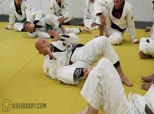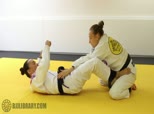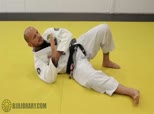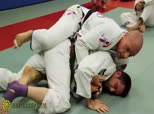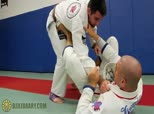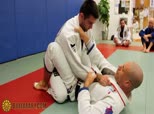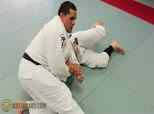Rafael Lovato Jr.'s Evolution of Jiu Jitsu 1 - Introduction and Warm Up
Add to Favorites Remove From Favorites 841 2394 days ago
In this series, Rafael Lovato Jr., the most decorated American Jiu Jitsu competitor to date, teaches some of the techniques he's been refining over the last several years. As of late, his focus has been on his MMA career, forcing him to adapt his Jiu Jitsu game to a style he can use in the cage as well. One of the main things he's been working on is his mobility, so he kicks off his seminar with a few warm up exercises to improve agility and flexibility.
Inside the University 497 - One Legged Hip Escape Drill
Add to Favorites 762 Remove From Favorites 2415 days ago
Starting from a shrimp position with the side of one leg and his elbow on the mat, Xande keeps his elbows to his stomach and his other leg off the mat. Pushing off his bottom leg, he takes small steps to move his body and rotate his hips to the other side. First he practices with about 5 steps to completion, and he can also do the entire movement in one fast step. This is a good drill to practice on your own, but can also be done with a partner on top.Leticia Ribeiro Series 2 - Self Defense Technical Stand Up when Attacker is in Your Guard
Add to Favorites 804 Remove From Favorites 2731 days ago
Leticia combines two of the most basic and important movements in Jiu-Jitsu, the hip escape and technical stand up, and uses them in a self defense situation common for women in particular. Her attacker is in her guard and choking her. Leticia first creates space by posting her feet on the mat and escaping her hips until she can place her feet on her opponent's hips. She pushes away some more and sits up, posting on her elbow. She places her opposite foot on the mat and pushes off the hip with her other foot, to stand up into base, protecting her face with her free arm. Finally, she runs away to escape her attacker.Inside The University 278 - Defensive Half Guard Movement Drills
Add to Favorites 1166 Remove From Favorites 3058 days ago
Xande shows some specific movement drills to help your defensive half guard game. He covers in depth, the shoulder escape and the technical standup using your elbow. These are the basic movements used in his upcoming defensive half guard lesson.Rafael Lovato Jr. Series 3 - Drilling Back Takes from Open Guard Passes
Add to Favorites 1636 Remove From Favorites 3453 days ago
Rafael continues to discuss his principles on drilling, but now he focuses on taking the back from passing the guard. He encourages students to drill whatever pass they like, but their partner will either turn into them or turn away from them and you take the back accordingly. Rafael also emphasizes that you should always finish the drill by setting up a choke or other submission after getting the back.Rafael Lovato Jr. Series 2 - Setting Up an Open Guard from a Seated Position when Your Opponent Is Standing
Add to Favorites 2036 Remove From Favorites 3454 days ago
Rafael continues to discuss his ideas on drilling, and shows how he likes to setup an open guard while seated and facing a standing opponent. Again, he emphasizes that everyone should setup the guard that works for their game. He also believes that after you drill a sweep, you should also drill a pass right away.Rafael Lovato Jr. Series 1 - Concepts on Drilling and Setting Up an Open Guard from the Closed Guard
Add to Favorites 2057 Remove From Favorites 3456 days ago
In this series, Rafael Lovato Jr. gives a seminar at the University of Jiu-Jitsu, and discusses his views on drilling and shows some of his favorite positions he's been using lately. He begins the seminar by showing how he likes to drill, focusing on setups rather than techniques. Here he talks about starting from the closed guard, getting his preferred grips and then setting up his preferred open guard. He leaves it up to each student to fit this drilling to his own individual game.Inside The University 196 - Passing the Closed Guard and Finishing the Kimura
Add to Favorites 1633 Remove From Favorites 3460 days ago
Saulo shows how to stand up and open the closed guard, pass with the knee slice, and immediately attack the Kimura. Rather than focusing on all the details, he is showing this position to practice as a speed drill.White Belt University 1.1 - Intro to Floor Drills
Add to Favorites 3141 Remove From Favorites 4073 days ago
The first chapter of the White Belt University will cover the basic floor drill movements such as break falls, rolling, hip mobility movements, and proper stand-up. In this lesson, Xande explains the purpose of floor drills and how we often practice them every training session to get our bodies warm but also to ingrain the movements into our muscle memory to keep us safe. These movements are found in various sweeps, passes, and defenses throughout jiu jitsu and are recognized as the core movements in the sport of Brazilian Jiu Jitsu.White Belt University 1.2 Breakfalls - The Proper Way to Fall Forward, Backward, and Sideways
Add to Favorites 2934 Remove From Favorites 4073 days ago
One of the first lessons that you may receive at a Judo or Brazilian Jiu Jitsu school is how to fall properly. In this lesson we learn how to fall properly in a forward, backward, and sideways breakfall. This is an important lesson to have early on because it can dramatically reduce unnecessary injuries from falling or being thrown. It is a common instinct for people who have not trained in a grappling sport to stiff arm the floor to try to catch themselves when falling. In this lesson we learn to practice our breakfalls to condition ourselves to breakfall instinctively rather than posting out with a straight arm. When being tossed or falling, stiff arming the ground is a good way to break your elbow or wrist. By slapping the mat in a proper breakfall, we disperse the energy of the impact throughout our body to reduce the damage done to one area of our body and effectively remove any concentrated trauma that may cause broken bones or joints.White Belt University 1.3 Rolling - Learning the Front, Back, and Side Rolls
Add to Favorites 2494 Remove From Favorites 4073 days ago
Our next lesson brings us to a mobility drill that is very important in your journey as a jiu jitsu practitioner. Learning to do a proper front roll or back roll early on can help any unnecessary injuries to our neck through improper form. Many gyms start their warm ups with front, back, and side rolls to ingrain these movements into our muscle memory so that we can roll instinctively even during the heat of a jiu jitsu fight.White Belt University 1.41 Hip Mobility - The Bridge or Upa
Add to Favorites 2241 Remove From Favorites 4073 days ago
In this lesson Xande teaches us our first lesson in the hip mobility series of our floor drills. The bridge is used in almost every match and primarily involves lifting the pelvis off the ground so that our body is supported by our feet and shoulders. The movement conditions our neck and back during our warm ups and is often used as a defensive movement during a match to create space between ourselves and our opponents when they have you pinned or have you mounted.

